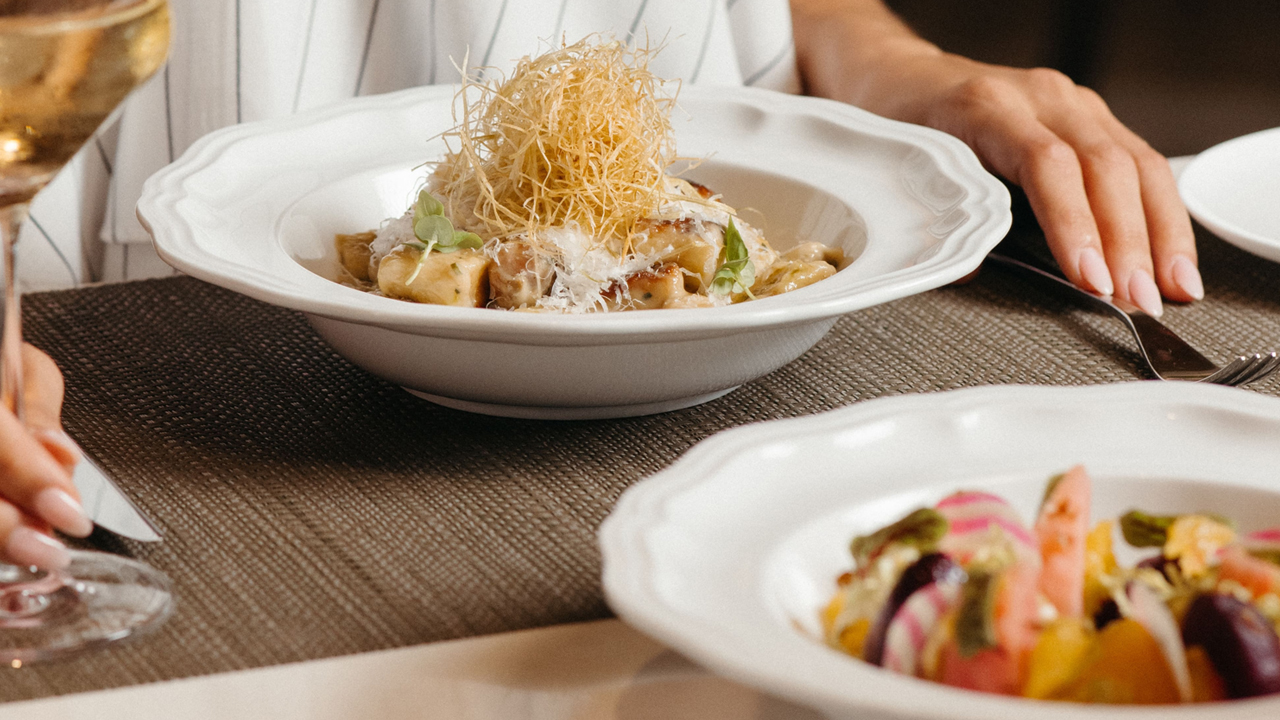Yes, Ayala Coffee has ube drinks: At this point, they’re as essential to a Filipino coffee shop as cà phê sữa đá — or Vietnamese iced coffee — is to a Vietnamese one. The Union, New Jersey coffee shop gets more niche with its inspiration. There are frothy Americanos enhanced with calamansi, espresso tonics with a touch of tamarind, cold brew enriched with Milo (as in the powdered chocolate drink mix) syrup, and lattes in playful flavors: pandan, cassava cake, leche flan, and jasmine, the Philippines’ national flower. Yes, it’s a series of “if you know, you know” touches, but generally speaking, they’re also just fun little drinks, full of the flavormaxxed flourishes people expect from coffee shops now.
Owners Trixie Jose and Matthew Reyes, who opened Ayala late last year, wanted to create a space in Union, where Jose grew up, for a younger generation of Filipinos. Nearby, “there are four or five other Filipino restaurants — mom and pops, super traditional,” Jose says. But those spaces tend to be full of people her parents’ age or older; Jose is 32, Reyes is 34. “We wanted to create a third space for people like us,” she says.
Ayala is part of a growing niche of Filipino coffee shops, joining establishments like Baby’s Kusina + Market in Philadelphia, Side Practice Coffee in Chicago, Kalesa in Portland, Oregon, Obet & Del’s in Los Angeles, and Teofilo Coffee in Carson, California. Even Lasita, the Filipino rotisserie chicken restaurant in Los Angeles, has launched a weekend cafe concept called Kapé Lasita, which serves drinks like a “langka-ppucino,” featuring jackfruit, or langka in Tagalog. Across the country, Filipino coffee shops have been picking up steam, capitalizing on consumers’ appetite for more interesting and complicated specialty drinks, as well their increased familiarity with flavors like ube and pandan. After all, almost everyone has ube now — even, at one point, Dunkin’.
For some operators, part of the goal is to bring a better understanding of Philippine flavors. As ubiquitous as ube — a tuber with mild, nutty flavor akin to vanilla — has become in the United States, it has also come with a level of erasure, both of origins and of taste as people using it prioritize its purple appeal. Jose recalls trying one ube syrup from a large company and barely tasting anything but sweetener.
“What was really important to us was making sure the flavors were as authentic as possible,” Jose says. Instead of relying on flavor extracts, Ayala makes its syrups with real ube, pandan leaves, and jasmine petals. Sometimes people hooked on the cassava cake latte ask where they can then find the original cake. “We’re serving as a gateway, in a non-traditional sense, to what Philippine cuisine is,” she says.
Indeed, a 2025 consumer insights report from Tastewise found that among Gen Z, interest in Filipino food is higher in coffee than in any other food or beverage category — a drink is a low-stakes way to try something new. That’s why Raquel Villanueva Dang wanted to open Baby’s, her all-day establishment in Philadelphia. “I wanted to create a space where people could experience Filipino food in a setting that’s a little bit more accessible and affordable,” she says. While you can ball out on a sizzling platter of fatty-bellied milkfish sisig for market price during dinner service, you can also just swing by in the morning for a Milo mocha, $6.50. Baby’s, a long-awaited opening, has become a neighborhood hotspot.
For some of these owners, centering the Filipino American perspective means also seeking out coffee beans from the Philippines. “If we’re going to do everything with intention, then we [should] do the extra legwork to bring in Filipino cultivated beans,” Dang says, noting the additional effort and costs.
Though the Philippines was once the fourth-largest coffee producer in the world, its production took a sharp decline during the late 19th century due to a disease that affects coffee plants, and it never fully bounced back. That’s not to say that Philippine farmers have stopped growing coffee, but rather that their prospects have been challenging. In recent years, there’s been a push to revitalize Philippine coffee from groups like Kalsada, which previously partnered with Blue Bottle in an attempt to return the Philippines to “coffee exceptionalism.”

At Ayala, Jose and Reyes source beans from Kalsada in the Philippines, then work with Modcup in Jersey City to roast them. Baby’s partners with Minorya Coffee, a small coffee farm in the Philippines, for its beans and then roasts them in collaboration with Philadelphia’s specialty Vietnamese roaster Càphê.
The Philippine-grown beans that form the basis of Baby’s espresso drinks are known as kapeng barako, and they’re not the typical arabica you’ll find at most coffee shops in the US. Rather, they’re liberica, a relatively rare (and not especially trendy, at least during this century) coffee variety known for its large bean size and bold flavor.
As perhaps you’ve noticed from the price of your regular bag of beans, a lot is going on with coffee lately: Volatile weather affecting coffee harvests in the major coffee suppliers of Brazil and Vietnam has sent prices soaring. Liberica, a hardier bean, could represent opportunity. “Given the status of coffee beans and the shortage of arabica, people are looking into liberica as the future of coffee beans,” says Regina Santos of Minorya. “When it comes to liberica, it’s about education and introducing it to the market.” Enter the ube latte made with barako.
The Filipino coffee shop represents so many different things at once. But for one thing, it feels like the future.







![14th Oct: Bebefinn (2025), 3 Seasons [TV-Y] – New Episodes (6/10)](https://occ-0-2644-448.1.nflxso.net/dnm/api/v6/Qs00mKCpRvrkl3HZAN5KwEL1kpE/AAAABeUxswBNRWzyDT2AZXFyj7H_7cUiC5RSpS4RYEU27WuSfR4p5jPxOc2bRMQ2XyCQfrzxklLvriz-6tDJPqg5Rl8aPA6XsoeCeum5NNq0wpnyfgv-WQIdaXVkpkKaDNxNDSqhekGHEZUxkNyfUmVxNE4Vnjo712O5xJMzkpMW.jpg?r=e6c)






